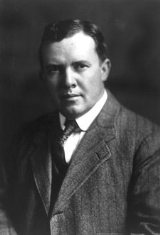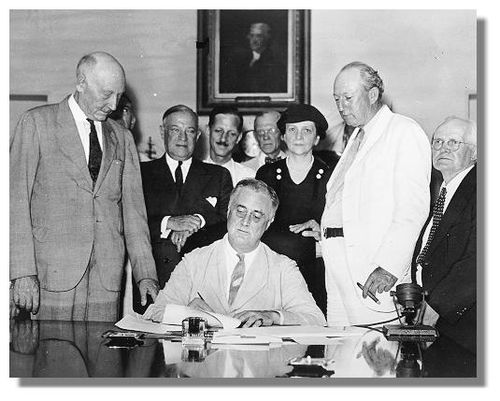
David John Lewis
Encyclopedia
David John Lewis was an American politician.
Born near Osceola Mills
, Centre County, Pennsylvania
, David worked in the local coal mines from 1878 to 1892. He studied law and Latin in his spare time, was admitted to the bar in 1892, and commenced practice in Cumberland, Maryland
.
David served as a member of the Maryland State Senate
from 1902 to 1906, and was an unsuccessful Democratic candidate for election to the Sixty-first Congress in 1908. In 1910, he was elected as a Democrat to the Sixty-second, Sixty-third, and Sixty-fourth Congresses, serving the sixth district
of Maryland from March 4, 1911 to March 3, 1917. During the Sixty-third and Sixty-fourth Congresses, he served as chairman of the House Committee on Labor. He was not a candidate for renomination in 1916, but was an unsuccessful Democratic candidate for election to the United States Senate.
From April 1917 to March 1925, David was a member of the United States Tariff Commission. He was again an unsuccessful candidate for the Democratic nomination for the United States Senate in 1922, and resumed the practice of law in Cumberland. He was again elected to the Seventy-second and to the three succeeding Congresses, serving the sixth district of Maryland from March 4, 1931 to January 3, 1939, but was not a candidate for renomination in 1938, having run for senator, challenging incumbent Millard Tydings
in the Democratic primary. Lewis was more sympathetic to the New Deal
than Tydings and won the backing of President Franklin Roosevelt. Nevertheless his third bid for the Senate was again unsuccessful, and instead he served as a member of the National Mediation Board
from 1939 to 1943. He died in Cumberland and is interred in Hillcrest Cemetery.
 David John Lewis was the leading expert on social insurance legislation on the House Ways & Means Committee. He introduced the Social Security bill into the House on January 17, 1935. However, Chairman Doughton, exercising what he took to be the Chairman's privileges, made a copy of Lewis' bill and submitted it himself. Then he persuaded the House clerk to give him a lower number than Lewis' copy. Newspapers then began calling the bill "The Wagner-Doughton bill." When Lewis found out, he sputtered and swore, then went to work to understand every sentence and master the arguments in favor of the bill. And when David Lewis walked down the aisle of the House to debate on the bill's behalf, he received a standing ovation – a subtle rebuke to Chairman Doughton's high-handed treatment.
David John Lewis was the leading expert on social insurance legislation on the House Ways & Means Committee. He introduced the Social Security bill into the House on January 17, 1935. However, Chairman Doughton, exercising what he took to be the Chairman's privileges, made a copy of Lewis' bill and submitted it himself. Then he persuaded the House clerk to give him a lower number than Lewis' copy. Newspapers then began calling the bill "The Wagner-Doughton bill." When Lewis found out, he sputtered and swore, then went to work to understand every sentence and master the arguments in favor of the bill. And when David Lewis walked down the aisle of the House to debate on the bill's behalf, he received a standing ovation – a subtle rebuke to Chairman Doughton's high-handed treatment.
Born near Osceola Mills
Osceola Mills, Pennsylvania
Osceola Mills is a borough in Clearfield County, Pennsylvania, United States. The population was 1,249 at the 2000 census.-Geography:Osceola Mills is located at ....
, Centre County, Pennsylvania
Centre County, Pennsylvania
Centre County is a county located in the U.S. state of Pennsylvania. It is part of the State College, Pennsylvania Metropolitan Statistical Area. As of 2010, the population was 153,990....
, David worked in the local coal mines from 1878 to 1892. He studied law and Latin in his spare time, was admitted to the bar in 1892, and commenced practice in Cumberland, Maryland
Cumberland, Maryland
Cumberland is a city in the far western, Appalachian portion of Maryland, United States. It is the county seat of Allegany County, and the primary city of the Cumberland, MD-WV Metropolitan Statistical Area. At the 2010 census, the city had a population of 20,859, and the metropolitan area had a...
.
David served as a member of the Maryland State Senate
Maryland State Senate
The Maryland Senate, sometimes referred to as the Maryland State Senate, is the upper house of the General Assembly, the state legislature of the U.S. state of Maryland...
from 1902 to 1906, and was an unsuccessful Democratic candidate for election to the Sixty-first Congress in 1908. In 1910, he was elected as a Democrat to the Sixty-second, Sixty-third, and Sixty-fourth Congresses, serving the sixth district
Maryland's 6th congressional district
Maryland's 6th congressional district elects a representative to the United States House of Representatives from the northwest part of the state. Today the district comprises all of Garrett, Allegany, Washington, Frederick and Carroll Counties, as well as portions of Montgomery, Baltimore, and...
of Maryland from March 4, 1911 to March 3, 1917. During the Sixty-third and Sixty-fourth Congresses, he served as chairman of the House Committee on Labor. He was not a candidate for renomination in 1916, but was an unsuccessful Democratic candidate for election to the United States Senate.
From April 1917 to March 1925, David was a member of the United States Tariff Commission. He was again an unsuccessful candidate for the Democratic nomination for the United States Senate in 1922, and resumed the practice of law in Cumberland. He was again elected to the Seventy-second and to the three succeeding Congresses, serving the sixth district of Maryland from March 4, 1931 to January 3, 1939, but was not a candidate for renomination in 1938, having run for senator, challenging incumbent Millard Tydings
Millard Tydings
Millard Evelyn Tydings was an attorney, author, soldier, state legislator, and served as a Democratic Representative and Senator in the United States Congress from Maryland.-Early life:...
in the Democratic primary. Lewis was more sympathetic to the New Deal
New Deal
The New Deal was a series of economic programs implemented in the United States between 1933 and 1936. They were passed by the U.S. Congress during the first term of President Franklin D. Roosevelt. The programs were Roosevelt's responses to the Great Depression, and focused on what historians call...
than Tydings and won the backing of President Franklin Roosevelt. Nevertheless his third bid for the Senate was again unsuccessful, and instead he served as a member of the National Mediation Board
National Mediation Board
The National Mediation Board is an independent agency of the United States government that coordinates labor-management relations within the U.S...
from 1939 to 1943. He died in Cumberland and is interred in Hillcrest Cemetery.
Social Security Act


